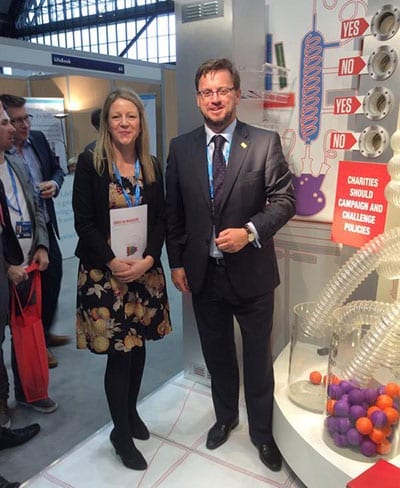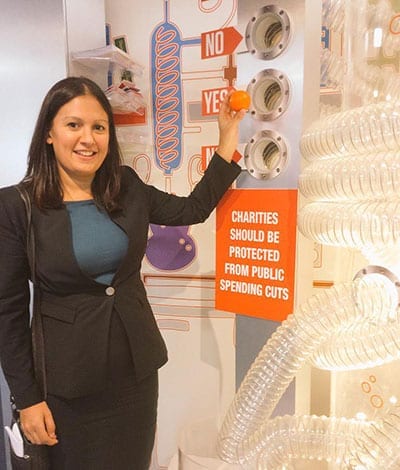Five things Charities Aid Foundation learned from the party conferences
CAF has visited the Conservative, Labour and Liberal Democrat party conferences over the past three weeks, holding events at each and speaking to hundreds of people. Here is what charities can take away from the annual gatherings of the faithful.

Rob Wilson MP at CAF stand at Conservative Party Conference, 2015
1. Charities are still seen as important by the political classes
… but the public want politicians to go further. OK, so there weren’t eye-catching policy announcements about charities on the conference floors – that’s to be expected. But in the corridors and on the fringe there was a lot of warmth for the not-for-profit sector and a lot of enthusiasm for the contribution that charities already make in communities – as well as appetite for increasing their role further. Research shows that voters don’t believe that politicians understand the importance of charities in Britain; engagement at conference and hearing first-hand from charities is an important step towards remedying that.
2. The summer stories have resonated
… but general attitudes towards charities remain positive. It’s clear from the engagement at CAF’s conference stand that stories about Olive Cooke, fundraising and Kids Company has piqued people’s interest in charities, and delegates at each conference were keen to talk about their attitudes with us. The conversations weren’t negative though – instead we mostly had positive discussions about how charities can improve levels of support and build stronger bonds with the public. With the public eye very much on the activities of charities, now is the time for the sector to build upon that interest and act to shore up levels of trust.

Lisa Nandy MP at CAF stand at Labour Party Conference 2015
Advertisement
3. Charities must get better at demonstrating their impact
… and no-one recognises this more than sector staff. People visiting our stand told us that most charities don’t do enough to get across the difference that they’re making, and our research and conversations show that people who work for charities are acutely aware that this is a problem. Communicating impact isn’t easy – nor is finding the time or resources to make it a priority – but there is certainly an appetite amongst the public and conference delegates to hear more about the impact of charities. As a sector we should fill that void and raise awareness of the contribution that charities make on a daily basis.
4. Conference still matters to charities
… and they excel in a crowded marketplace. The days of party conferences as a powerhouse for policy making may be long gone (for now?) but there’s still no better way for charities to easily get their messages across in person to decision makers. And the innovation of the sector jumps out when you see the impact that charities have with their stands and events, often put together for a fraction of the cost of corporate ‘competitors.’ Committing to conference season is a big decision for charities, but the pay-off can be well worth the effort.
5. Each party sees the role of charities differently
… but there is some common ground. For the Conservatives, there is particular support for getting more charities involved in the delivery of public services, using their local knowledge to provide personalised support to residents. Labour activists meanwhile believe that there is a vital role for charities as campaigners speaking up for the voiceless, and want charities protected from spending cuts. The Liberal Democrats have a genuine desire to build bridges with the charity sector and see how shared values of voluntarism and community activism can be put at the heart of their policy offer. Where there is agreement is on the need to get more young people engaged with social action, and cross-party consensus offers the hope of activity to install a commitment to supporting good causes amongst future generations.
Steve Clapperton is Campaigns Manager, Charities Aid Foundation
Photo: Houses of Parliament, London – by Claudio Divizia on Shutterstock.com



